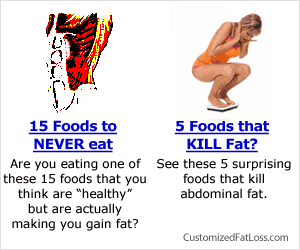Food And Exercise
Eating well can improve your workout and recovery. Whether training for your first half-marathon, heading outside for a vigorous walk, or leaving for a day of skiing, what you eat before and after your outing will play a role in how well you achieve your fitness goals. For a workout to be successful, it must include adequate nourishment to help pump up your exercise and burn belly fat along the way.
Fuel up before you start. Carbohydrates provide energy for your workout and works even better by combining them with a small amount of lean protein. For the morning it could be a whole wheat bagel with peanut butter or low-fat granola with low-fat yogurt. If you prefer to exercise in the evening look at a lean protein such as chicken, a whole grain like brown rice for the carbohydrate energy, and a salad or vegetable. Be sure to stay away from fatty foods that are harder to digest like carbonated beverages, which also cause bloating.
Trial and error will help determine how soon you can exercise after eating. It really depends on the individual where some people can eat 10 minutes before going for a long jog without any stomach discomfort and others can’t eat anything within two hours of running.
Whether you should eat while you’re exercising depends on how long you work out and at what intensity. If you’re exercising for more than an hour be sure to replace your glycogen stores (sugar stored in the muscles for energy) every 60 to 90 minutes. Some good choices to consider are energy bars, dried fruit, gels (a supplement found in sports stores and grocery stores), crackers, and sports drinks are good choices.
Hydration is important too. It’s a good idea to consume 14 to 22 ounces of water about two to three hours prior to exercising, even if you’re not thirsty. During exercise, how much you drink will depend on the intensity and duration of your workout. Some consideration should be taken into account for what level of exercise your preforming at. With moderate exercise probably a drink to quench your thirst. With a more intense workout think about drinking 6 to 12 ounces every 15 minutes. For those long and hard workouts when your actually losing weight a good general rule is to drink 16 to 24 ounces of fluid for every pound lost.
Food for the finish. Once you’re done exercising you need to think about helping your body to recover. We are back to using carbohydrates to restore glycogen and protein helps repair and work towards building muscle. Healthy post-workout snacks include chocolate milk, yogurt, fruit with string cheese, lean meat, or an English muffin with peanut butter.
For those who are exercising with the goal of shedding a few pounds giving up carbs entirely is not the best way to go. Your body actually needs carbohydrates at some level or your body will not function especially if you are a avid exerciser or competitor.
Everyone’s nutritional needs is different depending on the duration, intensity, and type of activity. Also, under consideration here as well are personal factors, such as age, gender, height, and weight. But everyone “” from the moderate exerciser to the hard-core athlete “” will benefit from eating well. Eat to pump up your exercising and burn that belly fat with time.
Visit our website for access to all additional product reviews at Fitness-Secrets-Center.
The Fitness-Secrets-Center focuses on providing our visitors a wealth of information concerning little known fitness secrets that are available at our site. We’ve pulled together thirty three products for visitors review comprising the best of the best Fitness Secrets and most highly purchased Ebook products out on the internet today. Our goal with this site is to provide our visitors the opportunity to be better informed of what options are available to them as they look to better their
Exercise over 40
Enough is enough, and too much is down right counterproductive. When you pursue a tough weight lifting routine, you are pushing your muscles and breaking them down. Resting the muscle groups between workouts is where the muscles rebuild even stronger than before to compensate against the damage.
Your exercise needs to consist of both aerobic exercise and anaerobic exercise. Aerobic exercise is the exercise which allows your body to consistently move for at least twenty minutes. I think you may relate this type of exercise with aerobic dancing. You can refer to that. Also, you can do jogging, running, swimming or even boxing. This type of exercise will help your cardiovascular function. Aerobic exercise is an essential part of your exercise over 40.
Neurogenesis means that my brain grows new brain cells daily, and, if I do not kill them with stress hormones or booze or VOC’s or high fructose corn syrup, and if I challenge them with some kind of novel learning experience, they end up helping my hippocampus form or recall memories.
Another top concern for women (or at least it should be) is bone health, our bones become dense when they are put under weight bearing. If your only exercise is walking you will not put your bones under enough stress to maintain your bone density. Even though walking is considered a weight bearing exercise and is good for you, it is not nearly as beneficial to your bones as weight lifting.
To work on your balance is easy and doesn’t involve expensive high tech equipment. A strong core area and core strength training go hand and hand with your ability to balance. Yoga and Pilates use a great deal of core training, typically all you need is a mat. A large part of these styles of exercise is coordinating movements through having a healthy mind and a healthy body. Focus and concentration during your exercise routine, while staying relaxed.
A prime example would be hockey players who experience a few minutes of ice time going full tilt then perhaps hitting the bench. In order for them to avoid muscle soreness, what many don’t know is that they go from the ice to a gym. Many hockey players avoid the build up by hitting a treadmill or bike to go through an actual aerobic session so they will be working to keep the lactic acid at the required threshold and avoid buildup.
Heart and Lung Capacity. As we age our muscles get weaker, especially the most important one of all, the heart! Our lungs do not function as well as they used to and it becomes harder to walk up the stairs or go out for a stroll with your family. Training for aerobic capacity can keep your heart and lungs functioning longer and stronger.
Not challenging yourself with increasing weight and intensity: Too often people engage in a ‘routine’ a t the gym they are comfortable with. It’s true you need to know what you are doing, the correct form and feel comfortable in your knowledge however you need to be changing things up. Learning new ideas or how to use a machine can challenge a muscle group in a new way and help you with your results. Changing the weight progressively will keep making the muscles you are working stronger and stronger.
Read about bodybuilding supplements. Also read about weight lifting workouts and nutrition for teenagers.
More Exercise Articles
Alcohol And Exercise
On Friday afternoon after you leave work, you probably
think about going out and having a few drinks with
friends to relax and wind down. Even though you
may think you deserve to go out and have a few drinks,
there are some things that you should certainly keep
in mind.
Like any other day, tomorrow is going to be a day
for exercise, and since you are exercising on a
regular basis, a few drinks of alcohol won’t really
hurt anything, right? Before you decide to rush out
to the local bar, there are a few things below that
you should think about before you make your choice
about going out to drink some alcohol.
Research has proven that even small amounts of
alcohol with increase muscular endurance and the output
of strength, although these types of benefits are
very short lived. After 20 minutes or so, the
problems will begin to surface. All of the negative
side effects associated with alcohol will easily
outweigh any possible benefits that it can have.
No matter how you look at it, alcohol is a poison
that can really harm your body if you aren’t careful.
The negative side of alcohol can reduce your
strength, endurance, aerobic capability, recovery
time, ability to metabolize fat, and even your
muscle growth as well. Alcohol will also have an
effect on your nervous system and brain. If you
use it long term, you can cause severe deterioration
of your central nervous system. Even with short
term use, nerve muscle interaction can be reduced
which will result in a loss of strength.
Once alcohol reaches the blood cells, it can and
probably will damage them. With alcohol users,
inflammation of the muscle cells is a very common
thing. Over periods of time, some of these cells
that have been damaged can die which will result
in less functional muscle contractions. Drinking
alcohol will also leave you with more soreness of
your muscles after you exercise, which means that
it will take you a lot longer to recuperate.
Check Out Tony Hortons Nutrition System Too
The power 90x Nutrition Plan
Alcohol will also have many different effects on
your heart and circulatory system as well. When
you drink any type of alcohol, you may begin to
see a reduction in your endurance capabilities.
Anytime you drink, your heat loss will increase,
due to the alcohol simulating your blood vessels
to dilate. The loss in heat can cause your
muscles to become quite cold, therefore become
slower and weaker during your muscle contractions.
Drinking alcohol can also lead to digestive and
nutrition problems as well. Alcohol cause a
release of insulin that will increase the metabolism
of glycogen, which spares fat and makes the loss
of fat very hard. Due to alcohol interfering
with the absorption of several key nutrients, you
can also become anemic and deficient with B type
vitamins.
Because your liver is the organ that detoxifies
alcohol, the more you drink, the harder your liver
has to work. The extra stress alcohol places on
your liver can cause serious damage and even
destroy some of your liver cells.
Since alcohol is diuretic, drinking large amounts
can put a lot of stress on your kidneys as well.
During diuretic action, the hormones are secreted.
This can lead to heightened water retention and no
one who exercises will want this to happen.
If you must drink alcohol, you should do it in
moderation and never drink before you exercise, as
this will impair your balance, coordination, and
also your judgement. Think about your health and
how you exercise – and you may begin to look at
things from a whole new prospective.
The power 90x workout program is designed to work using “muscle confusion,” aka high-intensity cross-training. The thought is that by working out different muscle groups every day, you avoid plateaus.
Check Out Tony Hortons Power 90x Nutrition Plan
The power 90x Nutrition Plan






-SMALL.gif)
